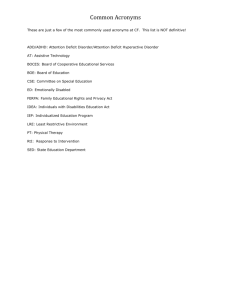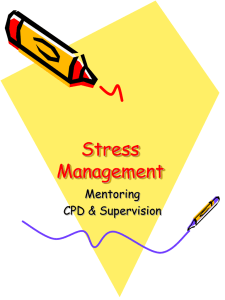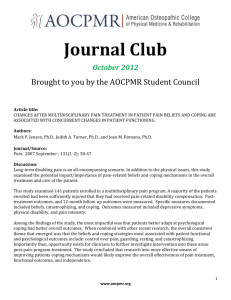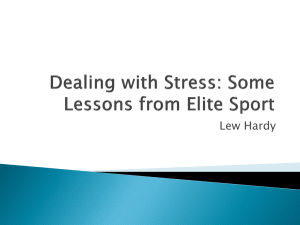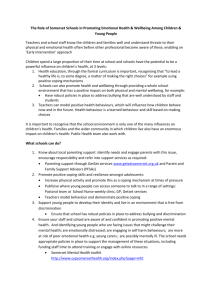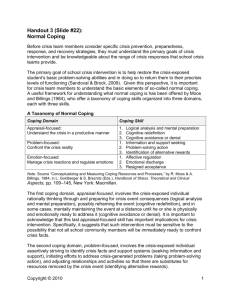The transition of children with ADHD into successful adults
advertisement
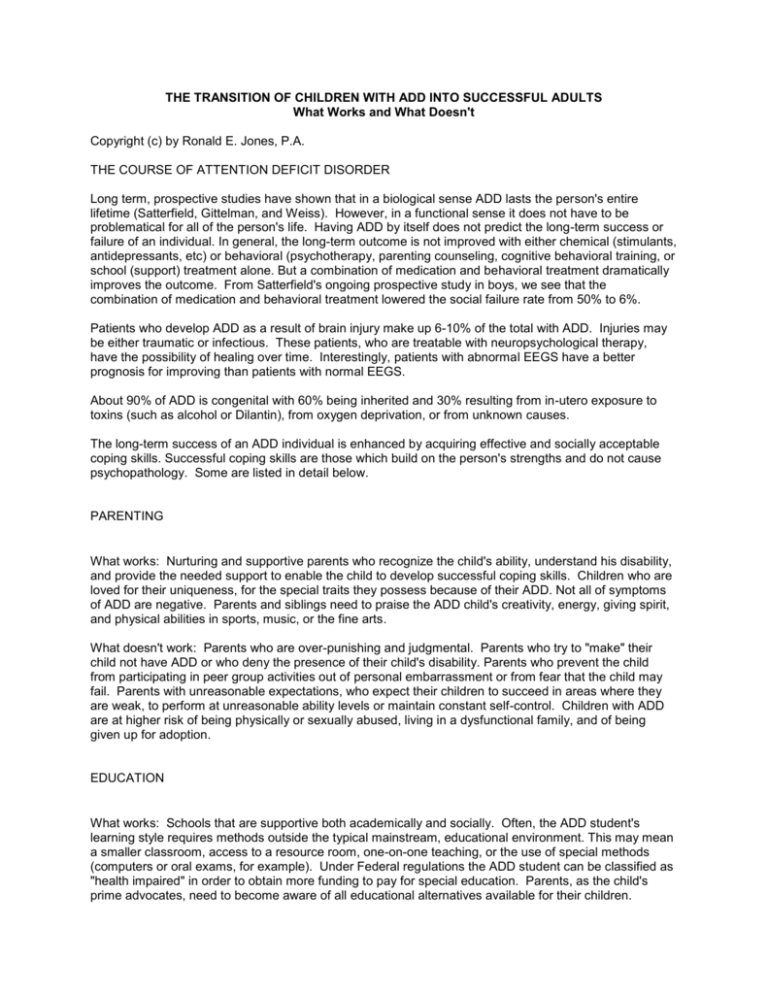
THE TRANSITION OF CHILDREN WITH ADD INTO SUCCESSFUL ADULTS What Works and What Doesn't Copyright (c) by Ronald E. Jones, P.A. THE COURSE OF ATTENTION DEFICIT DISORDER Long term, prospective studies have shown that in a biological sense ADD lasts the person's entire lifetime (Satterfield, Gittelman, and Weiss). However, in a functional sense it does not have to be problematical for all of the person's life. Having ADD by itself does not predict the long-term success or failure of an individual. In general, the long-term outcome is not improved with either chemical (stimulants, antidepressants, etc) or behavioral (psychotherapy, parenting counseling, cognitive behavioral training, or school (support) treatment alone. But a combination of medication and behavioral treatment dramatically improves the outcome. From Satterfield's ongoing prospective study in boys, we see that the combination of medication and behavioral treatment lowered the social failure rate from 50% to 6%. Patients who develop ADD as a result of brain injury make up 6-10% of the total with ADD. Injuries may be either traumatic or infectious. These patients, who are treatable with neuropsychological therapy, have the possibility of healing over time. Interestingly, patients with abnormal EEGS have a better prognosis for improving than patients with normal EEGS. About 90% of ADD is congenital with 60% being inherited and 30% resulting from in-utero exposure to toxins (such as alcohol or Dilantin), from oxygen deprivation, or from unknown causes. The long-term success of an ADD individual is enhanced by acquiring effective and socially acceptable coping skills. Successful coping skills are those which build on the person's strengths and do not cause psychopathology. Some are listed in detail below. PARENTING What works: Nurturing and supportive parents who recognize the child's ability, understand his disability, and provide the needed support to enable the child to develop successful coping skills. Children who are loved for their uniqueness, for the special traits they possess because of their ADD. Not all of symptoms of ADD are negative. Parents and siblings need to praise the ADD child's creativity, energy, giving spirit, and physical abilities in sports, music, or the fine arts. What doesn't work: Parents who are over-punishing and judgmental. Parents who try to "make" their child not have ADD or who deny the presence of their child's disability. Parents who prevent the child from participating in peer group activities out of personal embarrassment or from fear that the child may fail. Parents with unreasonable expectations, who expect their children to succeed in areas where they are weak, to perform at unreasonable ability levels or maintain constant self-control. Children with ADD are at higher risk of being physically or sexually abused, living in a dysfunctional family, and of being given up for adoption. EDUCATION What works: Schools that are supportive both academically and socially. Often, the ADD student's learning style requires methods outside the typical mainstream, educational environment. This may mean a smaller classroom, access to a resource room, one-on-one teaching, or the use of special methods (computers or oral exams, for example). Under Federal regulations the ADD student can be classified as "health impaired" in order to obtain more funding to pay for special education. Parents, as the child's prime advocates, need to become aware of all educational alternatives available for their children. In order for the ADD student to completely finish an assignment, he/she may have to be allowed to work on the assignment in small increments, thus assuring that over a period of time, they will finish the same amount of work as their peers. Often ADD students have difficulty in following verbal instructions and may need to be given these instructions in writing. The ADD student may also need help initiating tasks. Sometimes the ADD student is disorganized and may benefit from learning organizational techniques. Bound assignment books or assignment sheets which are checked daily by every teacher does help some students. It is important, however, that this be done consistently. Haphazardly, it can result in confusion for the ADD child. The problem that often causes the greatest stress in teachers is the ADD student's behavior. Fidgeting, squirming, tapping, doodling, humming, and chewing are all common behaviors in ADD students. These behaviors are coping mechanisms that the student uses to self-stimulate, helping him pay better attention in class. If the teacher cannot tolerate these behaviors and does not replace them with a form of positive stimulation, the student will continue with this undesired behavior. And, unfortunately, the misbehavior accelerates as the consequences come to bear. This misbehavior may be a reaction to social and academic systems which the ADD student understandably perceives as unfair. So, instead, the teacher should recognize the student's needs and provide for those needs in a manner which minimizes disruptions. The ADD student may need to build social skills in an environment that is less threatening than the regular classroom. It is important that this be supervised by a knowledgeable adult. Smaller classrooms or social skills groups provide bridges to help the child experience positive social interactions. Social skills are enhanced when the student is involved in an activity where they have a natural ability such as sports, art, drama, or computers. The school needs to place emphasis on the ADD student's strengths while recognizing the student's weaknesses. Remember the student already perceives the classroom as unfair. To gain the student's motivation, we have to praise his abilities and confirm these abilities to his classmates. Tasks that are repetitive and boring present the greatest challenge for the ADD student. Tasks that emphasize creativity, a quick response, artistic ability, or eye-hand coordination are usually naturally easier for the ADD student. It is within these parameters that he will experience his greatest success. Students with ADD love working for specific goals. Goal-setting and positive reinforcement are the most important motivation methods to use with ADD students. These methods can turn a boring task into one that is meaningful and enjoyable. What doesn't work: Schools that over-punish, that set up arbitrary and inflexible rules based on the majority of student's abilities and weaknesses. Schools that see Special Education as only remedial education and do not allow for the development of students' strengths. Schools that emphasize that students take responsibility for their actions without seeing that the system may be unfair. Schools that assume that all students should have the same abilities regardless of the situation. Schools that fail to recognize that some socially unacceptable behaviors are a learned, coping mechanism. Schools that try to extinguish these behaviors without helping students develop effective coping skills. Methods that place the student at a higher risk of failure: (open room concepts, team teaching, cluster seating, term papers, and independent study). One of the worst responses a school can make is to continually increase the level of punishment for failing to comply or for talking back. The result is a power struggle that has no end. Another mistake is to assume the student knows what the rules are. Remember that people with ADD don't have good mental organization skills and are especially poor at applying social rules. Consequently, they also have difficulty applying rules over a variety of situations. They will often cite general rules and try to apply them universally. The rules need to be explained and repeated frequently. The consequences for violating the rules need to be applied consistently and fairly. Rules that are too restrictive set the student up for failure. We must also deal with situations that the student perceives as being high risk. We need to teach the student appropriate intervention skills that will not humiliate him in front of his peers. By not allowing the student to leave high risk situations, we increase the likelihood of initiating or continuing aggressive behavior. If we teach the student to walk away when he is being harassed by other students, but then fail to allow him to do so, we should not be surprised when his behavior takes violent, confrontive, or assaultive directions. It is a mistake to place ADD students together with other students who already have aggressive behaviors. The ADD student can learn misbehavior, but worse, we set up the ADD student to be victimized. ADD students often have low self-esteem and will "buy" friendship by doing whatever another student asks of them. They are naturally attracted to students who misbehave because of the feelings of risk-taking and arousal this gives them. When people with ADD are aroused, they feel more in control and normal because of the chemical changes this causes in the brain. This need for arousal should be seen as one of the basic needs of ADD students. COPING SKILLS What works: By adolescence, often sooner, the ADD child has begun developing an array of coping mechanisms to help him be more successful both socially and academically. Some coping skills may later develop into pathological patterns of behavior. The more appropriate coping skills are listed here: The ADD person often has expressive language skills that far exceed their receptive abilities. This means they are better talkers than listeners. Listening can be repetitive and boring. Talking is arousing and risk-taking. This means it feels reinforcing to the person with ADD. Also, when they are doing the talking, they are in control of the conversation, preventing it from going into areas that are repetitive or uninteresting. Being in control of the conversation also gives them the ability of entertaining other people. They can win admiring responses from others. The development of strong expressive language skills can be useful in our society. Ministers, teachers, radio announcers, etc. all have to have strong verbal skills, as do sales people who often refuse to take "NO!" for an answer. Tasks which are physically stimulating or creative are natural strengths for the person with ADD. Painting, drawing, sports, construction, and physical labor can be developed into well paying and respected jobs: fine arts, construction trades, sports, engineering, design, etc. When we look at these fields, we find a higher incidence of ADD adults. ADD people often have problems with authority figures for many reasons: past memories of abuse, difficulty following another person's rules and pace, and difficulty with impulsive reactions. Thus, the ADD person finds success in going their own way. Being your own boss carries with it a lesser risk of failure than being supervised by someone else. One exception to this rule is the military. People with ADD often do very well in the military because of the combination of having, in general, very clear rules, flexible work schedules and individual tolerance. Productivity is not as much a concern, and it's very hard to be "fired." The ADD person achieves his best productivity when he sets his own work schedule. Thus, "piece work" is more accommodating than a standardized work schedule where the inability to follow work schedules may cause problems, especially with unions and fellow workers. Because of his impulsiveness, the ADD person may develop a habit of timing himself out or leaving a situation. This can be a very successful coping skill in helping to avoid aggressive behavior. It can, however, cause problems for other people who want to resolve the conflict immediately. Leaving the scene of a conflict can also cause some secondary problem behaviors such as passive-aggressive responses. For this reason, it is always important for the ADD person and the adults responsible for ADD children to keep a well-grounded understanding of the reality of the situation and the ADD person's responsibility toward that situation. Developing a good sense of humor is certainly beneficial in dealing with conflicts the ADD person is certain to face, and it also helps to smooth over any upsetting situations the ADD person creates. Taken to the extreme, however, the person with ADD can become the "class clown" with his humor becoming a point of derision as well as admiration. "The life of the party" can become a social bore if he doesn't know when to stop. Being married to one of these individuals can be fun at first, until one realizes that humor pervades this individual's social interactions whether it's appropriate to the situation or not. In planning a formal education, having a high interest in a particular field of study may mean that it could be a good career choice. The feeling of excitement in a particular career needs to be balanced with a sober understanding of what the job actually entails on a day-in, day-out basis, however. People with ADD are natural entrepreneurs, but the daily management of a business may need to be done by another person. What doesn't work: I commonly see one of two maladaptive social skill habits that may develop in people with ADD. The first is a discovery of strong expressive language skills which may lead to domination over other people or the development of a controlling personality. This can progress to the establishment of codependent relationships, social isolation, or personality disorders. The second track is one of opposite development, low self-image resulting in a passive personality that sets ADD people up for domination and victimization. This also can result in codependent relationships. Either track could lead to criminal behavior, substance abuse, and life on the periphery of society, depending upon whether or not the ADD person can learn compensating skills and retain a positive self image. Anger can be a way of releasing feelings of hostility when life is treating you unfairly, and this response comes all too easily for the person with ADD. Anger can have a very desired response, however, other people will tend to leave you alone. Unfortunately, this can also limit the variety of social experiences and may result in isolation and depression. Aggressive behavior may impress people who are also antisocial, however, and the bonds of friendship may form in social circles which can lead to criminal behavior. Sometimes the ADD adult becomes a "workaholic" because he enjoys his work, and it's one of the few times he feels normal and comfortable. This can lead to physical, emotional, and social suffering. In meeting his own needs, the ADD adult may be failing to meet the needs of his wife and children. He may have trouble enjoying the "fruits" of his labors. While seeking reward in material items, he may be living with the loneliness of having few close friendships. Substance abuse is usually a coping mechanism for secondary effects stemming from ADD, such as depression, difficulty sleeping, anger control problems, loneliness, and struggling with unfulfilled expectations. Self-medicating, in this respect, can bring on its own problems such as criminal activity, withdrawal from social contact, risk of addiction, and physical harm. A typical pattern, which I've seen in some of my ADD patients, is that of experiencing several failed attempts in substance abuse treatment programs. If the underlying disorder (ADD) and the patient's need for appropriate medication is not recognized, then the course of the treatment is less likely to be favorable. Substance abuse treatment is more likely to be successful if the underlying disorders are also being treated at the same time. The ADD adolescent is also at risk and may associate with the criminal element out of desperation to obtain meaningful friendships and respect from at least one group of peers. The consequences involved in this pattern of development is obvious. My personal experience is that once the adult has done "hard time" in an adult prison, it is extremely difficult to reverse the pattern of criminal behavior. However, short stays in juvenile detention or in local jails for misdemeanor offenses are a common part of the history of adults who were ultimately successful. Therefore, intervention should begin at the earliest age possible so that the ADD individual can realize his greatest potential in a positive way. SUMMARY The successful transition of children with Attention Deficit Disorder into successful adults depends on the effectiveness of their compensatory mechanisms and on the choices they make in relationships, careers, and living situations. Individuals with ADD may represent the best and worst in society. As we learn more about ADD and change our societal systems to support the uniqueness of individuals with ADD, I have hope that we may change the prevailing statistical outcomes. The current cost to society is great both in dollars and lost productivity, and we're just beginning to weigh the costs to individual potential. Greater still is the individual suffering of patients and their families. Our goal together, as a society, is to make every individual a success story. Ron Jones, P.A. Attention Deficit Disorder Clinic 3000 Limited Ln SW Suite 135 Olympia, WA 98502-2704 (206) 754-4801 READING LIST Articles: Satterfield, J.H., Hoppe, C.M., and Schell, A.M. A prospective study of delinquency in 110 adolescent Attention Deficit Disorder and 88 normal adolescent boys. American Journal of Psychiatry, 139: 797-798, 1982. Weiss, G., Hechtman, L., Milroy, T., and Perlman, T. Psychiatric status of hyperactives as adults: a controlled 15-year follow-up of 63 hyperactive children. Journal of the American Academy of Child Psychiatry, 24: 211-220, 1985. Gittelman, R., Mannuzza, S., Schenker, R., and Bonagura, N. Hyperactive boys almost grown up. Archives of General Psychiatry, 42: 937-947. Books: Barkley, Russell A. Attention Deficit Hyperactivity Disorder, A Handbook for Diagnosis and Treatment. The Guilford Press, New York, N.Y. 1990. Wender, Paul. The Hyperactive Child, Adolescent, and Adult. Oxford Press, New York, N.Y. 1987. Ingersoll, Barbara. Your Hyperactive Child. Doubleday, New York, N.Y. 1988. Weiss, G. and Hechtman, L. Hyperactive Children Grown up. Guilford Press, N.Y. 1986 _______________________________________________________________________ This is for information purposes only and is not to be substituted for medical advice from the professional of your choice. This article has been downloaded from the ADD Forum on CompuServe, and may be distributed freely as long as the contents of the file are unchanged. Because the CompuServe ADD Forum is new, we are frequently asked how to join CompuServe and get on the forum. Call 1-800-524-3388 and ask for rep #464. Outside the US/Canada call +1-614-457-0802.

